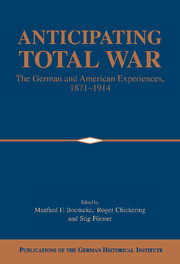Book contents
- Frontmatter
- Introduction
- Part One Germany, The United States, and Total War
- Part Two War and Society
- 3 The Political Economy of Warfare in America, 1865-1914
- 4 Hugo Stinnes and the Prospect of War Before 1914
- 5 War Preparations and Ethnic and Racial Relations in the United States
- 6 Religion and War in Imperial Germany
- 7 Socializing American Youth to Be Citizen-Soldiers
- 8 Preparing German Youth for War
- 9 Heroes and Would-Be Heroes: Veterans' and Reservists' Associations in Imperial Germany
- 10 Mobilizing Philanthropy in the Service of War: The Female Rituals of Care in the New Germany, 1871-1914
- Part Three Memory and Anticipation: War and Culture
- Part Four The Experience of War
- Index
10 - Mobilizing Philanthropy in the Service of War: The Female Rituals of Care in the New Germany, 1871-1914
Published online by Cambridge University Press: 05 January 2013
- Frontmatter
- Introduction
- Part One Germany, The United States, and Total War
- Part Two War and Society
- 3 The Political Economy of Warfare in America, 1865-1914
- 4 Hugo Stinnes and the Prospect of War Before 1914
- 5 War Preparations and Ethnic and Racial Relations in the United States
- 6 Religion and War in Imperial Germany
- 7 Socializing American Youth to Be Citizen-Soldiers
- 8 Preparing German Youth for War
- 9 Heroes and Would-Be Heroes: Veterans' and Reservists' Associations in Imperial Germany
- 10 Mobilizing Philanthropy in the Service of War: The Female Rituals of Care in the New Germany, 1871-1914
- Part Three Memory and Anticipation: War and Culture
- Part Four The Experience of War
- Index
Summary
There is something daunting about researching the place of war in German statecraft. For most of the twentieth century, historians of different political persuasions and for different purposes have analyzed the subject in depth from a variety of perspectives. Indeed, the accumulated research has established a chilling picture of the ways in which the German war machinery and militaristic values and mentalities dominated the heart of the German polity. This is particularly salient - so the argument goes - in understanding the political culture of Imperial Germany, Bismarck's peculiar political construction that constitutionally insulated the military apparatus from essentially all civilian control and accountability. Nicolaus Sombart captures well the main outline of the argument when he writes:
The [Second] Reich as a political entity cannot be likened to any other state existing in Europe at the time. It was not a ‘nation-state,’ nor a clear-cut monarchy. . . . It was dominated by its strongest member - Prussia - a quasi-absolutist military monarchy, that amazing soldier-state which . . . had built up its power through warfare and robbery and which was made unique by the overwhelming role played by the army as a determining factor in shaping society in its own image. . . . The spirit and pattern of military organization were imposed on all inhabitants of the empire, regardless of class or region, and in spite of the existence of quite different traditions, most notably in the south-west of Germany. . . . The upper classes were permeated by the values of the Prussian officer corps, and the rest of the population was subjected to military discipline and standards through compulsory military service. . . . The dominant social values were martial and, thus, in a very emphatic sense, male. . . . This discriminated against at least 51 percent of the population: women. “La femme n’existe pas!”
- Type
- Chapter
- Information
- Anticipating Total WarThe German and American Experiences, 1871–1914, pp. 217 - 238Publisher: Cambridge University PressPrint publication year: 1999

